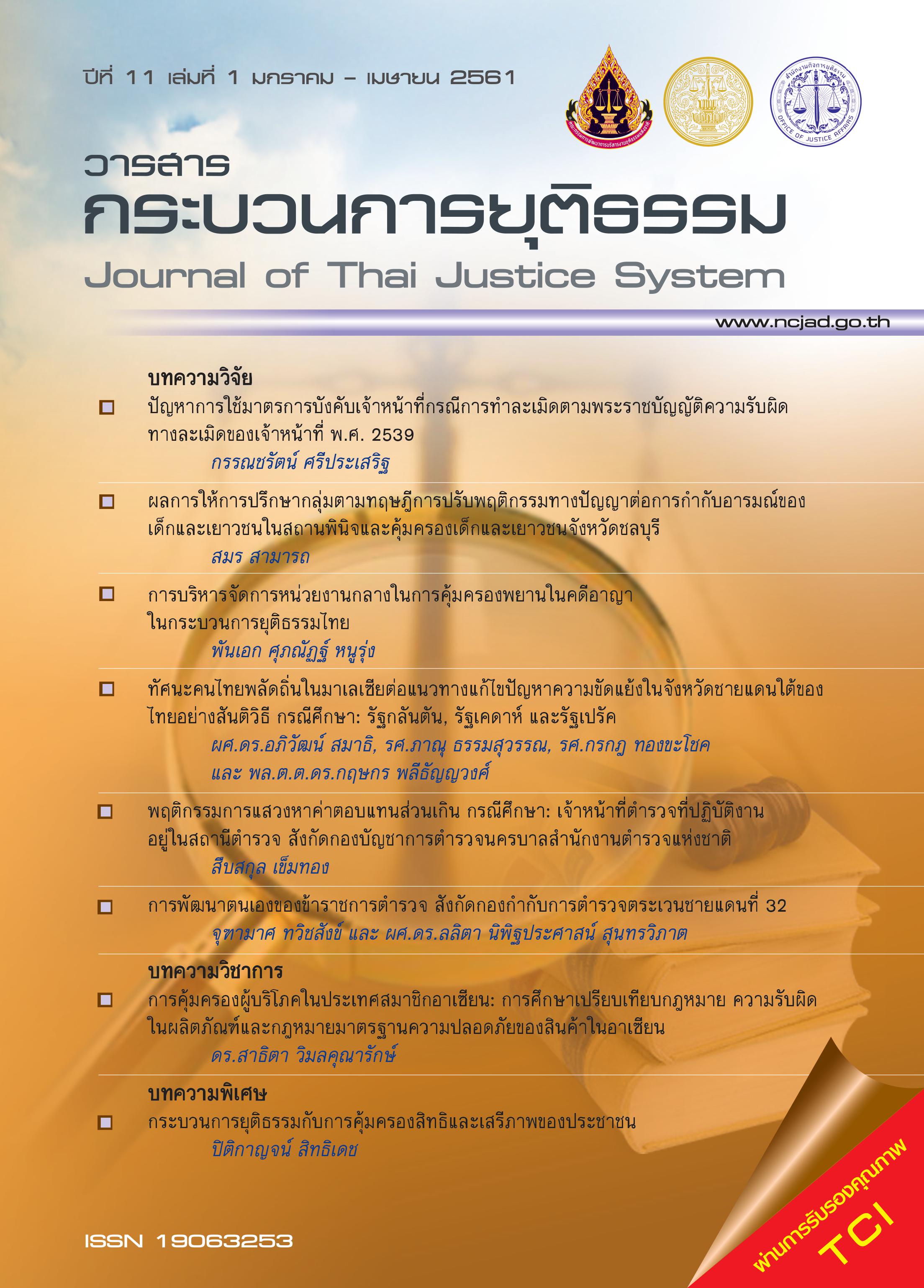พฤติกรรมการแสวงหาค่าตอบแทนส่วนเกิน กรณีศึกษา: เจ้าหน้าที่ตำรวจที่ปฏิบัติงานอยู่ในสถานีตำรวจ สังกัดกองบัญชาการตำรวจนครบาล สำนักงานตำรวจแห่งชาติ
Main Article Content
บทคัดย่อ
งานวิจัยนี้มุ่งศึกษาถึง พฤติกรรมการแสวงหาค่าตอบแทนส่วนเกินของเจ้าหน้าที่ตำรวจที่ปฏิบัติงานอยู่ในสถานีตำรวจ สังกัดกองบัญชาการตำรวจนครบาล โดยทำการเก็บรวบรวมข้อมูลเชิงคุณภาพด้วยการสัมภาษณ์เชิงลึก จากเจ้าหน้าที่ตำรวจในระดับปฏิบัติการและระดับบริหาร จำนวน 32 คน และภาคประชาชนตลอดจนภาคธุรกิจที่เคยประสบกับพฤติกรรมการแสวงหาค่าตอบแทนส่วนเกินของเจ้าหน้าที่ตำรวจ จำนวน 9 คน ประกอบกับการศึกษาข้อมูลเชิงทุติยภูมิที่เกี่ยวข้อง โดยทำการศึกษาในช่วงเวลาระหว่างเดือนมีนาคม 2557-พฤษภาคม 2560 ปรากฏผลการศึกษาด้วยวิธีการวิเคราะห์เนื้อหาว่า ระดับของอำนาจในตำแหน่งของสายงานทั้ง 5 ด้าน ในสถานีตำรวจ ได้แก่ 1) งานอำนวยการ 2) งานป้องกันปราบปราม 3) งานสืบสวน 4) งานสอบสวน และ 5) งานจราจร มีความแตกต่างกันตามอำนาจหน้าที่ภารกิจความรับผิดชอบในหน้าที่ ระดับของตำแหน่ง จำนวนอัตรากำลัง ค่าตอบแทนที่ได้รับโดยชอบตามระเบียบที่กำหนดและที่ได้มาโดยมิชอบ รวมไปถึงบริบทแวดล้อมของแต่ละพื้นที่ ซึ่งระดับของอำนาจในตำแหน่ง จะส่งผลต่อรูปแบบพฤติกรรมในการแสวงหาค่าตอบแทนของเจ้าหน้าที่ตำรวจในสองลักษณะคือ 1) การลงทุนเพื่อให้ได้มาซึ่งการผูกขาดอำนาจในตำแหน่ง พบว่าเจ้าหน้าที่ตำรวจจะมีพฤติกรรมในการอาศัยความใกล้ชิดผู้มีอำนาจหรือผู้บังคับบัญชา การให้ทรัพย์สินหรือผลประโยชน์หรือการช่วยเหลือ รวมไปถึงการขอรับการแต่งตั้งในตำแหน่งตามที่ระเบียบกำหนด และ 2) การใช้อำนาจในตำแหน่งในการแสวงหาค่าตอบแทนส่วนเกิน พบว่าเจ้าหน้าที่ตำรวจในแต่ละสายงานก็จะมีรูปแบบและระดับของของพฤติกรรมในการแสวงหาค่าตอบแทนส่วนเกินแตกต่างกันตามอำนาจหน้าที่และความรับผิดชอบ และมีรูปแบบพฤติกรรมทั้งในลักษณะการใช้อำนาจส่วนบุคคล และการใช้อำนาจในภาพรวม ข้อเสนอเสนอแนะในการแก้ไขสามารถดำเนินการโดยปรับปรุงระบบค่าตอบแทนในทุกมิติ ปรับปรุงระบบกลไกการกำกับตรวจสอบ ปรับปรุงอำนาจหน้าที่ที่เพื่อควบคุมการใช้อำนาจดุลยพินิจ การปรับปรุงหลักเกณฑ์การแต่งตั้ง และปลูกฝังทัศนคติและสร้างความรู้ความเข้าใจในการปฏิบัติงานของเจ้าหน้าที่ตำรวจ
Article Details
ต้นฉบับที่ได้รับการตีพิมพ์ในวารสาร เป็นลิขสิทธิ์ของวารสารกระบวนการยุติธรรม แต่ความคิดเห็นที่ปรากฏในเนื้อหาของบทความในวารสารกระบวนการยุติธรรม ถือเป็นความรับผิดชอบของผู้เขียนแต่เพียงผู้เดียว
เอกสารอ้างอิง
เกินขอบเขต กรณีเจ้าพนักงานตำรวจใช้อำนาจหน้าที่โดยมิชอบ. รายงานวิจัย. สำนักงานคณะกรรมการป้องกันและปราบปรามการทุจริตแห่งชาติ.
จุฑารัตน์ เอื้ออำนวย และคณะ. (2551). ความเป็นไปได้ในการโอนภารกิจของสำนักงานตำรวจแห่งชาติ. รายงานการศึกษาวิจัย. คณะอนุกรรมการด้านการปรับปรุงและพัฒนากฎหมาย คณะกรรมการพัฒนาระบบงานตำรวจ.
นรศักดิ์ ม่วงศรี, ร.ต.อ. (2554). ทัศนคติของข้าราชการตำรวจสัญญาบัตรต่อบทบาทนักการเมืองในการเบื่อนตำแหน่งและแต่งตั้งโยกย้ายข้าราชการตำรวจ: ศึกษากรณีกองบังคับการตำรวจนครบาล 8. วิทยานิพนธ์ปริญญาโท. มหาวิทยาลัยธรรมศาสตร์.
พรปิยะ ชุณห์ศรี. (2542). ความสัมพันธ์นอกระบบราชการ: ที่มา แบบแผน และการปรับเปลี่ยนแผนความสัมพันธ์นอกระบบในกรมตำรวจ. ดุษฎีบัณฑิต. มหาวิทยาลัยศรีนครินทรวิโรฒ.
มูลนิธิสถาบันวิจัยนโยบายเศรษฐกิจการคลัง. (2555). โครงการจ้างที่ปรึกษาเพื่อศึกษาระบบเงินเดือน และค่าตอบแทนด้านต่างๆ ของข้าราชการตำรวจ. โครงการศึกษา. สำนักงานตำรวจแห่งชาติ.
บริษัท เอพีเอ็ม กรุ๊ป โซลูชั่น จำกัด. (2555). โครงการศึกษาแนวทางการพัฒนาระบบการบริหารทรัพยากรบุคคลของสำนักงานตำรวจแห่งชาติ. โครงการศึกษา. สำนักงานตำรวจแห่งชาติ.
ปริยากร โพธิ์ทอง. (2546). การเลื่อนตำแหน่ง และแต่งตั้งโยกย้ายในวงการตำรวจไทย: วิถีแห่งคุณธรรมฤาอุปถัมภ์. วิทยานิพนธ์ปริญญาโท. มหาวิทยาลัยเกษตรศาสตร์.
ภนัดบุญ สุวรรณรัตน์. (2543). การเมืองกับการบริหารงานตำรวจ. ภาคนิพนธ์ปริญญาโท. มหาวิทยาลัยธรรมศาสตร์.
ศรีสมบัติ โชคประจักษ์ชัด. (2554). แนวทางการบริหารงานบุคคลของสำนักตำรวจแห่งชาติ. รายงานวิจัย.
สำนักงานเลขาธิการวุฒิสภา.
ศุภชัย ยาวะประภาษ และคณะ. (2550). รายงานการศึกษาวิจัยเรื่อง แนวคิดการปรับโครงสร้างสถานีตำรวจเพื่อประชาชน. นนทบุรี: คณะกรรมการพัฒนาระบบงานตำรวจ กระทรวงยุติธรรม.
สถาบันบัณฑิตพัฒนบริหารศาสตร์. (2555). การสำรวจความคิดเห็นของประชาชนเกี่ยวกับปัญหาคอรัปชั่น. ศูนย์สำรวจความเห็นของประชาชน. กรุงเทพฯ
สังศิต พิริยะรังสรรค์. (2549). ทฤษฎีคอร์รัปชั่น. กรุงเทพ: พิมพ์ดีการพิมพ์.
สุพจน์ จุนอนันตธรรม และคณะ. (2547). รายงานฉบับสมบูรณ์การทุจริตและประพฤติมิชอบในหน่วยงานราชการไทย กรณีศึกษาสำนักงานตำรวจแห่งชาติ (ตำรวจนครบาล). สถาบันวิจัยสังคมและเศรษฐกิจ มหาวิทยาลัยธุรกิจบัณฑิตย์.
สมชาติ เสงี่ยมภักดี, ร.ต.อ. (2544). ระบบอุปถัมภ์ในสังคมไทยศึกษากรณีการแต่งตั้งโยกย้ายข้าราชการตำรวจสัญญาบัตร. วิทยานิพนธ์ปริญญาโท. มหาวิทยาลัยรามคำแหง.
Barker, T., Hunter, R., Rush, J. (1994). Police systems and practices: An introduction. New Jersey: Prentice Hall.
Boatright, J.R. (2009). “Rent Seeking in a Market with Morality: Solving a Puzzle About Corporate Social Responsibility” In Journal of Business Ethics. 88, pp. 541-552.
Buchanan J.M. (1980). “Rent Seeking and Profit Seeking”. In Toward a Theory of Rent-Seeking Society. College Station: Texas A&M University Press.
Chowdhury, L. (2008). “Economic Approaches in Corruption Studies” In Fiscal Frontiers.
Heidenheimer, A.J., Johnston, M. (2007). Political Corruption Concepts & Contexts. 3rd ed. Transaction Publishers: New Jersey.
Klitgaard, R. (1998). “International Corporation Against Corruption.” In Finance & Development. March. Pp. 291-303.
Kruger, A. (1974). “The Political Economy of The Rent Seeking Society”. In American Economic Review, 64. pp. 291–303.
Pope, J. (2000). Confronting Corruption: The elements of a National Integrity System. Berlin: TI.
Myint, U. (2000). “Corruption: Causes, Consequences and Cures.” In Asia-Pacific Development Journal. 7(2). pp. 33-58.
Myrdal, G. (1968). Asian drama: an inquiry into the poverty of nations. Pantheon.
Ricardo, D. (1817). On the Principles of Political Economy and Taxation, Introduced by Fogart, M.P. Ed. London: J.M. Dent & Sons.
Robinson, M. (1998). “Corruption and Development”. In European Journal of Development Research, 10, pp. 1-14.
Rose-Ackerman, S. (1975). “The Economics of corruption.” In Journal of Political Economy. IV. pp. 187-203.
Tullock, G. (1989). The Economics of Special Privilege and Rent Seeking. Boston: Kluwer Academic.
Wright, P.M., Dunford, B.B. and Snell, S.A. (2001). “Human Resources and the Resource Based View of the Firm”. In Strategic Human Resource Management theory and practice, 2nd pp. 17-39. London: SAGE.


